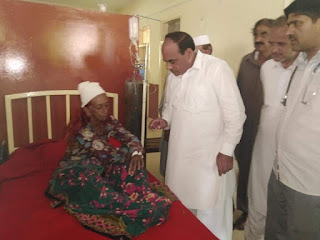A Pakistan army soldier and a woman were martyred and at least eight other civilians, four of them women, were wounded in Azad Jammu and Kashmir (AJK) on Saturday in “unprovoked and indiscriminate” shelling by Indian troops from across the Line of Control (LoC), military and civilian officials said.
The military casualty took place in Haji Pir sector of Haveli district and the civilian casualties occurred in Nakyal and Goi sectors of Kotli district, they said.
“Havaldar Nasir Hussain embraced martyrdom after Indian troops resorted to unprovoked firing in Haji Pir sector,” said the Inter Services Public Relations (ISPR) in a brief statement earlier in the day.
The 33 years old martyred soldier, with 16 years of service, was resident of Narowal district in Punjab, the ISPR said.
On Thursday, Sepoy Ghulam Rasool, belonging to Bahawalnagar, was martyred in the same sector.
In Kotli district, shelling from across the divide started at 9am, initially in Nakyal sector and later in the neighbouring Goi sector as well, during which Indian troops used mortar guns and targeted civilian populations, according to deputy commissioner Dr Umer Azam.
 Fatima Bibi, 45, daughter of Feroz Khan was martyred in Balakot village of Nakyal sector after being hit by splinters from a shell, he said.
Fatima Bibi, 45, daughter of Feroz Khan was martyred in Balakot village of Nakyal sector after being hit by splinters from a shell, he said.
Mr Azam identified the injured persons as Muhammad Rashid, 45, in Goi village of Goi sector and Nazia Bibi, 36, Shah Begum, 70, Gul Yasmin, 55, and her daughter Shumaila, 21, Muhammad Lal, Muhammad Ilyas, 28, and Muhammad Sabir, 48 in Daryari Palani, Androth Palani and Dharoti Mohra villages of Nakyal sector.
Muhammad Lal had also got his two buffalos and one goat killed due to shelling, he added.
 Pictures shared by the villagers on social media showed clouds of smoke arising from the areas where mortar shells had struck.
Pictures shared by the villagers on social media showed clouds of smoke arising from the areas where mortar shells had struck.
Deputy commissioner Azam said some houses had also been partially damaged by shelling.
He said Indian troops also hit a middle school for girls in Lanjot village of Nakyal sector, damaging its tin roof.
 However, fortunately, all students had already been evacuated to a nearby protection bunker which averted physical losses in the institution, he said.
However, fortunately, all students had already been evacuated to a nearby protection bunker which averted physical losses in the institution, he said.
Meanwhile, in a brief statement AJK Prime Minister Raja Farooq Haider condemned “unprovoked and indiscriminate” Indian shelling across the restive LoC.
“Neither can India subdue the residents along the ceasefire line (LoC) with such cowardly acts nor can it divert attention from the nightmarish situation in occupied Kashmir,” he said.
The heavily militarised LoC that splits the disputed region of Kashmir between Pakistan and India has been witnessing frequent ceasefire violations by Indian troops, in a serious breach of a truce agreement the armies of both countries had signed in Nov 2003
Tensions already prevailing between the two sides since an attack on an Indian army convoy in Pulwama area of occupied Kashmir in February this year touched new heights after India scrapped the special status of occupied Kashmir through a rushed presidential order and put the occupied territory under a lockdown, clamping round the clock curfew and communications blockade.
According to civilian and military sources, at least 38 civilians and 18 soldiers have lost their lives and another 186 civilians have sustained injuries in different areas of AJK along the LoC in 2019 due to ceasefire violations by Indian army.
Meanwhile, in Islamabad the Foreign Office (FO) summoned Indian Charge d`Affairs Gaurav Ahluwalia to lodge a protest against Saturday's "unprovoked ceasefire violations" by the Indian army.
According to a statement issued by the FO, Director General (SA & SAARC) Dr Mohammad Faisal urged the Indian side to respect the 2003 ceasefire arrangement and permit the UN Military Observers Group for India and Pakistan to play its mandated role as per UN Security Council resolutions.
"The Indian occupation forces along the LoC and Working Boundary have continuously been targeting civilian populated areas with artillery fire, heavy-calibre mortars, and automatic weapons," the FO press release said.
"The deliberate targeting of civilian populated areas is indeed deplorable and contrary to human dignity, international human rights and humanitarian laws. The ceasefire violations by India are a threat to regional peace and security and may lead to a strategic miscalculation," it added.
Tariq Naqash







